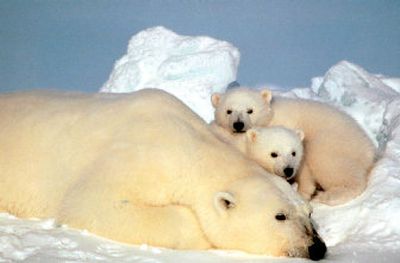Bush to seek polar bear protections

WASHINGTON – The Bush administration has decided to propose listing the polar bear as threatened under the Endangered Species Act, putting the U.S. government on record as saying that global warming could drive one of the world’s most recognizable animals out of existence.
The administration’s proposal – which was described by an Interior Department official who spoke on condition of anonymity – stems from the fact that rising temperatures in the Arctic are shrinking the sea ice that polar bears need for hunting. The offi-cial spoke on condition of anonymity because the department will submit the proposal today for publication in the Federal Register, after which it will be subject to public comment for 90 days.
Identifying polar bears as threatened with extinction could have an enormous political and practical impact.
As the world’s largest bear and as an object of children’s affection as well as Christmastime Coca-Cola commercials, the polar bear occupies an important place in the American psyche.
Because scientists have concluded that carbon dioxide from power-plant and auto emissions is helping drive climate change worldwide, putting polar bears on the threatened species list would raise the legal question of whether the government would be required to compel U.S. industries to curb carbon dioxide output.
“We’ve reviewed all the available data that lead us to believe the sea ice the polar bear depends on has been receding,” said the Interior official, adding that U.S. Fish and Wildlife Service officials have concluded that polar bears could be endangered within 45 years. “Obviously, the sea ice is melting because the temperatures are warmer.”
Northern latitudes are warming twice as rapidly as the rest of globe, according to a 2004 scientific assessment, and by the end of this century, annual ocean temperatures in the Artic may rise an additional 13 degrees Fahrenheit. As a result, researchers predict that summer sea ice, which polar bears use as a platform to hunt for ringed seals, will decline 50 percent to 100 percent.
Just this month, researchers at the National Center for Atmospheric Research outlined a worst-case scenario in which summer sea ice could disappear by 2040.
By submitting the proposal today, the Interior Department is meeting a deadline under a legal settlement with three environmental advocacy groups – the Center for Biological Diversity, the Natural Resources Defense Council and Greenpeace – that argue the U.S. government has failed to respond quickly enough to the polar bear’s plight.
There are 20,000 to 25,000 polar bears worldwide, 4,700 of which live in Alaska and spend part of the year in Canada and Russia.
Other countries with polar bears in their Arctic regions include Norway.
The Interior official said government officials studying Alaskan polar bears in the southern Beaufort Sea area have observed thinner adult bears and a lower rate of survival among cubs. Although the population has not yet dipped, “unless the polar cub survival rate goes up, it would have to happen,” the official said.
Still, the official added that the decision to propose polar bears as threatened with extinction “wasn’t easy for us” because “there is still some significant uncertainty” about what could happen to bear populations.
Although federal officials have cited rising sea temperatures once before in a threatened species proposal – in May, when they called rising temperatures a “major stressor” on Caribbean elkhorn and staghorn coral – today’s proposal marks the first time the Bush administration has identified the effects of climate change as the driving force behind a species’ potential demise.
Robert Correll, the scientist who chaired the international Arctic Climate Impact Assessment in 2004 and now directs the global change program at the H. John Heinz III Center for Science, Economics and the Environment, said in an interview that the proposal to place polar bears on the threatened species list is “highly justified.”
Correll added that he is participating in a Bush administration-funded study at the Center for Strategic and International Studies on how climate change could affect national security and foreign policy.
That, along with the proposal on polar bears, he said, “plays into a reality that, in my opinion, they’re going to be rethinking their position” on global warming.